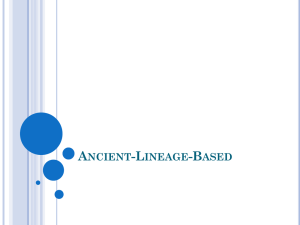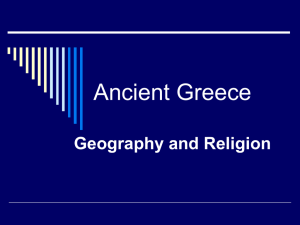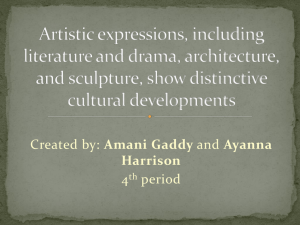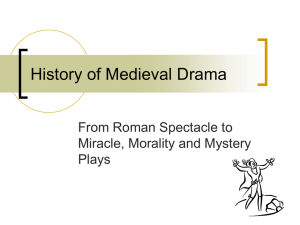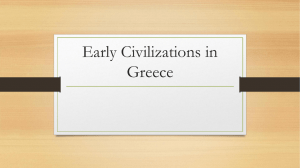Sabbatical Application -- English
advertisement
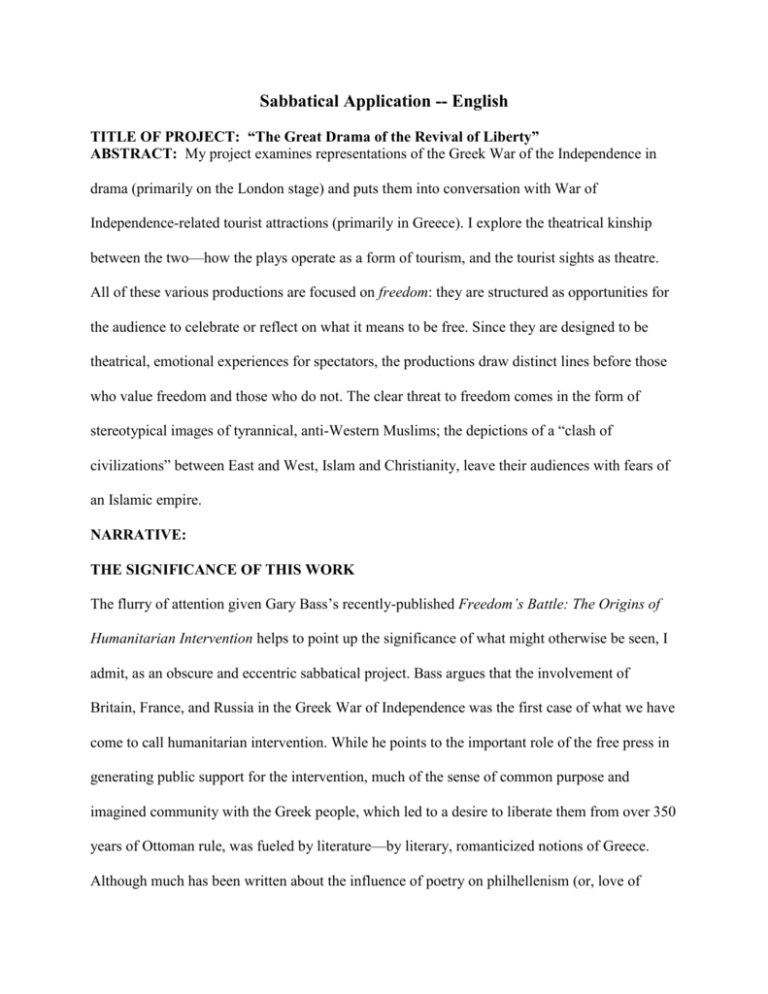
Sabbatical Application -- English TITLE OF PROJECT: “The Great Drama of the Revival of Liberty” ABSTRACT: My project examines representations of the Greek War of the Independence in drama (primarily on the London stage) and puts them into conversation with War of Independence-related tourist attractions (primarily in Greece). I explore the theatrical kinship between the two—how the plays operate as a form of tourism, and the tourist sights as theatre. All of these various productions are focused on freedom: they are structured as opportunities for the audience to celebrate or reflect on what it means to be free. Since they are designed to be theatrical, emotional experiences for spectators, the productions draw distinct lines before those who value freedom and those who do not. The clear threat to freedom comes in the form of stereotypical images of tyrannical, anti-Western Muslims; the depictions of a “clash of civilizations” between East and West, Islam and Christianity, leave their audiences with fears of an Islamic empire. NARRATIVE: THE SIGNIFICANCE OF THIS WORK The flurry of attention given Gary Bass’s recently-published Freedom’s Battle: The Origins of Humanitarian Intervention helps to point up the significance of what might otherwise be seen, I admit, as an obscure and eccentric sabbatical project. Bass argues that the involvement of Britain, France, and Russia in the Greek War of Independence was the first case of what we have come to call humanitarian intervention. While he points to the important role of the free press in generating public support for the intervention, much of the sense of common purpose and imagined community with the Greek people, which led to a desire to liberate them from over 350 years of Ottoman rule, was fueled by literature—by literary, romanticized notions of Greece. Although much has been written about the influence of poetry on philhellenism (or, love of Greece, and, specifically, support for the Greek revolution), very little attention has been given to a wave of plays that inspired people not just to support the establishment of Greece as an independent state, but to visit it for themselves. Across Europe in the 1820s, audiences from London and Paris to the Greek diasporic community of Odessa enjoyed theatrical productions that situated them vicariously on the sidelines of battles between Turk and Greek, or exhorted them to educate themselves and join the revolution. My project examines these representations of the Greek War of the Independence in drama (primarily on the London stage) and puts them into conversation with War of Independence-related tourist attractions (primarily in Greece). As a performance studies specialist, I am interested in exploring the theatrical kinship between the two. The plays operate as a form of tourism, I argue, by appealing to spectators’ desire for voyeurism, adventure, and enlightenment. In turn, attractions such as panoramas, wax museums, famous figures’ homes turned into museums, and re-enactments of historical events are experienced much like a theatrical performance; the success of their effect depends upon visual appeal, achievement of verisimilitude or fantasy, and the ability to evoke in viewers feelings such sympathy, anger, pride, and patriotism. Most significantly for our own time, all of these various productions are focused on freedom: they are structured as opportunities for the audience to celebrate or reflect on what it means to be free. Since they are designed to be theatrical, emotional experiences for spectators, the productions draw distinct lines before those who value freedom and those who do not. As Toni Morrison argues, “there is quite a lot of juice to be extracted from plummy reminiscences” of freedom “if the tree upon which such fruit hangs” is a stereotyped population (64). The clear threat to freedom, in these plays and tourist attractions, comes in the form of stereotypical images of tyrannical, anti-Western Muslims; the depictions of a “clash of civilizations” between East and West, Islam and Christianity, leave their audiences with fears of an Islamic empire. With this project I’m joining the conversation begun by scholars of 16th and 17th century literature, such as Daniel Vitkus, Gerald MacLean, and Nabil Matar, who have re-interpreted British playwrights’ representations of Islam and “Turks” onstage and English travelers’ experiences in the Ottoman Empire. My own research in Romantic-era drama is in closest affinity with Diego Saglia on 1820s British drama set in Mediterranean countries and concerned with freedom and tyranny; Daniel O’Quinn on the power of theatrical productions to sway public opinion of the British empire; Edward Ziter on the anthropological aspirations of orientalist melodramas; and, specifically related to Greece, Ian Macgregor Morris on the influence on drama of early travelers’ visits to Thermopylae and Gonda Van Steen on the political agenda of a revival of The Persians before the Greek War of Independence. BASIC DESCRIPTION OF THE PROPOSED WORK My research agenda for the year will be gathering data for and conceptualizing a book-length project, “The Great Drama of the Revival of Liberty.” The title comes from the preface to Shelley’s Hellas—where he proclaims “we are all Greeks”—and alludes to both dimensions of the project: dramas about liberty, and the dramatic show of reviving the long-suppressed liberty in Greece. My primary texts are twelve plays, and the principal activity for this part of the study is textual analysis, examining the plays side-by-side with historical documents and production evidence as much as possible (e.g., the script of Lazaria the Greek; or, The Archon’s Daughter can be read alongside the minutes of the London Greek Committee, which sponsored a benefit performance at the Royal Coburg Theatre in 1823). Within the texts I’m particularly interested in patterns and individual expressions of the theme of liberty, the ideology of liberalism, and the representation of Greeks and Turks, as well as, aesthetically, the range of dramatic forms (lyrical closet drama, historical tragedy, melodrama) used to move audiences to philhellenism. The sights I’ve selected are a part of Greeks’ modern national heritage; I examine them much as I would the texts and performances, taking careful note of their composition, the history of their creation, the ideology they espouse, the numbers and demographics of visitors to them, and the intellectual and emotional effects they have on the visitors. To facilitate research in Greece and cultivate relationships with Greek scholars who can help temper and make more nuanced my understanding of Greek culture and history, I have applied for a Fulbright Lecturing/Research Award. If accepted, I will be in the Department of English Literature and Culture at the University of Athens from February-June 2010, teaching one course in contemporary American drama and collaborating with Dr. Efterpi Mitsi on a project that combines our mutual interest in British travelers, armchair and actual, to Greece. MY PREVIOUS WORK IN THE AREA OF THIS PROJECT This is a continuation of work I’ve been doing for the past few years. I’ve given three conference presentations, one of which was revised into my foundation piece; also titled “‘The Great Drama of the Revival of Liberty’: Philhellenic Drama of the 1820s,” it theorizes philhellenic drama as a distinct category of plays of the early nineteenth century, and is forthcoming in Emancipation, Liberation, Freedom: British Romantic Drama 1775-1830, edited by Gioia Angeletti. The project has also grown out of and been shaped by my teaching: with graduate students I have taught independent studies on Byron and on Romantic Hellenism and philhellenism, and directed an M.A. thesis on one of Byron’s “Eastern Tales” about Greece, The Corsair. Most significantly, “In Byron’s Shadow: Romanticizing and Realizing Greece,” the course I created for UMAIE study abroad (J-terms 2004, 2006, and 2008), was designed with this very topic in mind; in it, students examine writers’ processes of romanticizing Greece and its independence movement, and reflect on their own experiences as travelers and world citizens, their own tendencies to idealize and become disillusioned. MY SPECIFIC PROFESSIONAL GOALS FOR THIS PROJECT My end goal is a book of essays on connections between plays and tourist attractions about the Greek War of Independence and their influence on a tourist culture focused on freedom. (Projected chapters include: how philhellenic drama served as a form of tourism for Britons; the construction of Ali Pasha into melodramatic villain and tourist attraction; representations of Bouboulina as war heroine in a painting that resembles “Washington Crossing the Delaware”; analysis of the theatre of tourism in a 19th-century panorama in London’s Rotunda promising realistic depiction of battle between Greeks and Turks; and exploration of Messolonghi’s identity as a sacred city of liberty.) The Comparative Drama Conference has been an effective firsthearing venue for this work thus far; I have presented two previous papers on this project there and plan to return with my new discoveries, as well as to the conferences of the Modern Greek Studies Association and the North American Society for the Study of Romanticism. While the research will have the most immediate effect on my study abroad course, serving to deepen and complicate it (and vice versa, as I plan to teach “In Byron’s Shadow” during the sabbatical period and will be testing the questions with the students, collecting data for my study), I plan to incorporate instruction in archival research into a graduate course, and to use my newlydeveloped skills in analyzing cultural sights to do more site-specific work with students. In addition, if I win a Fulbright award, the lecturing experience should provide me with new perspectives on American drama and performance culture for my next iteration of those courses. I also anticipate returning with improved advice to offer as a study abroad advisor for English majors, and ideas to invigorate colleagues in teaching for global citizenship. OFF-CAMPUS LOCATIONS FOR THE WORK Off-campus locations include the University of Minnesota (for a Modern Greek language course and the Basil Laourdas Collection), and Athens and the prominent War of Independence-era tourist areas of Nafplion, Spetses, Ioannina, and Messolonghi in Greece. The timetable on the next page provides more details, but, briefly, I’ll visit Nafplion, original capital of modern Greece; in Athens I’ll research in the Gennadius Library and the National Historical Museum; on Spetses I’ll visit the home of war heroine Laskarina Bouboulina; in Ioannina, I’ll visit Ali Pasha’s fortress and the Vrellis Wax Museum; and in Messolonghi, perhaps the most important city associated with the War of Independence, I’ll visit the Garden of Heroes, the Museum of the History and the Art of the Holy City of Messolonghi, and the Byron and Philhellenism research center, and will observe the annual “Exodos” celebration.

